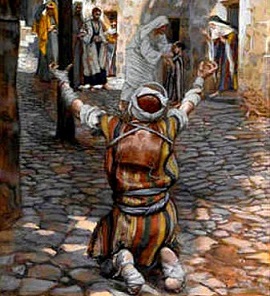 (Wis 6:1-11; Ps 82:3-4, 6-7; Lk 17:11-19)
(Wis 6:1-11; Ps 82:3-4, 6-7; Lk 17:11-19)
Arguably the biggest challenge – and the biggest responsibility – I have as a parent is trying to instill a morality in my child. Like almost all parents, my wife and I started out with simple proclamations when our son was a baby: “Don’t touch the hot thing! Don’t push another child! Share your toys!” Before our child could really speak or understand, the implications were still clear: “Don’t do that thing, or you’ll be scolded by your parents and possibly disciplined.” As our son got older, we started explaining why the rules existed: “Don’t touch the hot thing, or else you might get hurt. Don’t push another child because he might get hurt, and because you wouldn’t like to be pushed. Share your toys, because it helps everyone get along better.”
As he’s gotten older still, we’ve tried to get him to use his God-given conscience to extrapolate and understand the underlying principles of what we’ve tried to tell him. “Be aware of your surroundings, so you can preemptively avoid accidents. Do what you can to avoid hurting anyone else, because that helps make the world a better place. Keep your heart charitable and your eyes open for opportunities to help.”
Thus, we’ve tried to provide our son with a foundation of how to act. We don’t specifically say not to trip another child, but we’d definitely discipline him if he did so, because we feel he should know better based on the more broadening ideals we’ve instilled in him. In contrast, a colleague’s family has taken a more proscriptive view of discipline. If their kid were forbidden from watching television until she finished her homework, she might not get in trouble if she went over to a friend’s house and watched television instead, because going over to the friend’s house wasn’t expressly forbidden. (At the very least, father and daughter would probably have an argument, where the exact nature of what was specifically banned would be debated endlessly.)
Much of what Christ did in his teachings was to cut through the codification of what had been proscribed in the Old Testament, and try to instill in people a notion of “you know what God meant.” The Old Testament – especially books such as Exodus and Leviticus – had built a foundation of principles that proscribed exactly what not to do, which was expanded upon by Jewish tradition. Thus the ban of working on the sabbath was rigorously parsed to define what “work” was, when exactly the “sabbath” started, where the “home” was defined, etc.
But then Jesus came along and healed folks on the sabbath, in seeming defiance of the Commandment to avoid work on the sabbath. Jesus said, “Is it lawful to do good on the sabbath rather than to do evil, to save life rather than to destroy it?” And thus his accusers remained silent. (Mark 3:4)
All of these thoughts came to mind as I reflected on today’s readings. Look at the Gospel selection from Luke, where Jesus heals ten lepers. Only one – a Samaritan – returns to thank Christ. Jesus has a mild criticism of the other nine: “Ten were cleansed, were they not? Where are the other nine? Has none but this foreigner returned to give thanks to God?” (Luke 17:17-18)
Now, the other nine lepers had not done anything actively wrong, per se. While there are plenty of exhortations to be thankful to God, there’s nothing directly in the Ten Commandments about being grateful to others for good deeds done to you. (There’s also nothing in the Ten Commandments that says you need to actively do good deeds, which obviously isn’t what God intends for us.) If the lepers didn’t know at the time that Jesus was God – which seems likely – then their lack of thanks may not have been forbidden by the letter of the law. But Jesus called them out on their ingratitude . . . as well he should. Because even if there’s nothing specifically in the laws about being grateful to others, our hearts tell us that we should do better; if we fail to do so, that’s our fault, not the law.
The law shouldn’t need to spell out everything that is good to do; we should strive to do better. That theme continues in today’s first reading from the Book of Wisdom. Its author doesn’t have any specific crimes that kings are guilty of, but he knows that they know they’re not living up to God’s ideal of generosity and stewardship: “Because, though you were ministers of his kingdom, you judged not rightly, and did not keep the law, nor walk according to the will of God, Terribly and swiftly shall he come against you, because judgment is stern for the exalted . . .” (Wisdom 6:4-5) We don’t need to list specific crimes the kings are guilty of, because they’re self-evident if you take the time to search your hearts. In other words: kings, you know better than that.
We were not put on this Earth to argue the law, nor to get away with the bare minimum to satisfy our perceived obligations. We’re supposed to love God with all our hearts, and we’re expected to love our neighbors as we do ourselves. We shouldn’t expect God to explicitly tell us what to do in all situations; in most cases, we know what the loving and generous thing to do is. If we need help, two thousand years of smart thinkers in the Church have written and prayed extensively on pretty much every aspect of morality. But the long and short of it for today’s readings is, if you’re entrusted with power, use it justly and graciously. If you’re given a great gift, be grateful. To do otherwise is to disappoint God . . . and we should know better than that.
